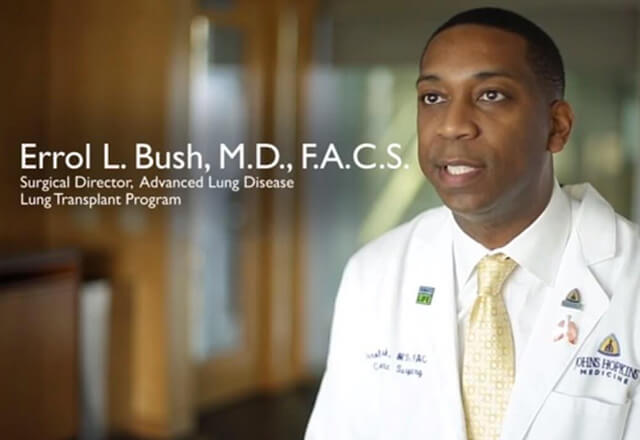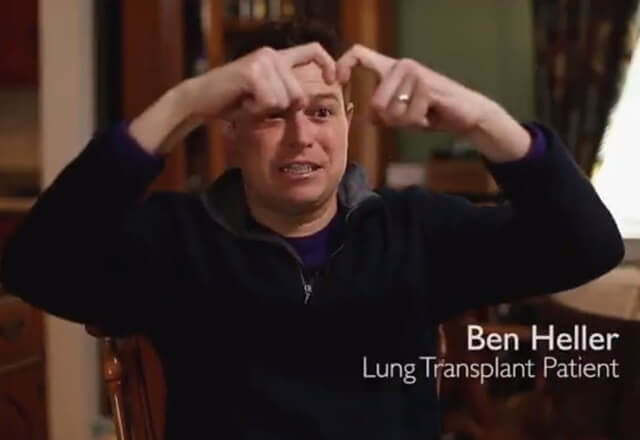Patient Resources and FAQs

A lung transplant is a therapy for late-stage lung disease, when the patient’s lungs cannot sustain themselves. There are several situations in which a lung transplant may be considered. These include, but are not limited to:
- end-stage lung disease
- bronchopulmonary dysplasia or chronic lung disease
- pulmonary hypertension
- heart disease or heart defects affecting the lungs
- pulmonary fibrosis
- cystic fibrosis
- alpha-1-antitrypsin deficiency
In general, patients with lung cancer are not eligible for transplants. However, this depends on the type of lung cancer. Some patients may require a heart-lung transplant. You are encouraged to speak with your doctor or a member of our transplant team to explore your options.
Getting to Transplant
-
The lung transplant team will conduct a comprehensive evaluation to determine whether you are eligible for a transplant. You will work with a transplant nurse coordinator and the lung transplant team, which includes surgeons, a social worker, a psychologist, a nutritionist, rehabilitation specialists and others.
Once you have completed your evaluation, your health status and history will be presented to the transplant committee. Good candidates usually have an excellent support system already in place at home. Many of the team members you meet during your evaluation are on the committee. These experts will make the final decision on whether transplantation is a good option for you.
The evaluation time takes approximately one to two months.Eligibility:
- Smoking: You cannot be evaluated for lung transplant if you have smoked or used nicotine in the last 6 months.
- Age: You can be evaluated for transplant until age 75 at The Johns Hopkins Hospital.
- BMI: If you have a body mass index (BMI) greater than 30, you may be asked to lose weight prior to transplant.
-
The average patient getting a lung transplant is in his or her 50s. However, over the last five to 10 years there has been a dramatic increase in older patients getting lung transplants. Five years ago, the approximate age limit was between 60 to 65 years old, but that is no longer the case. Transplants have been offered to people in their 70s, and although the risks are higher, through proper selection, terrific success has occurred within this age group.
-
Most of your testing will be done at Johns Hopkins Hospital over a four day period.
Testing will be personalized to your health but may include:
- Blood work and urine testing
- Chest x-ray
- CT Scan
- V/Q Scan
- Swallowing tests
- Bone density testing
- PFTs and other tests in pulmonary lab
- Heart catheterization
- Echocardiogram
- EKG
- Mammogram (females over 40) Pap smear (females)
- Colonoscopy (if older than 50)
Consultations may include:
- Transplant Pulmonologist
- Transplant Surgeon
- Pre-Transplant Nurse Coordinator
- Social Worker
- Nutritionist
- Psychiatrist
- Dentist
-
Learn more about the new Composite Allocation Score (CAS) from the Organ Procurement & Transplantation Network.
-
Because a lung donated for transplant is only viable for a few hours without transplantation, you can be called into the hospital for surgery at any time. Prior to surgery, you will be asked to review and sign an informed consent form. During surgery, you may be connected to a heart-lung machine to maintain blood flow and oxygen; however, this is not necessary for all patients. An incision is made across the chest, so that the heart and lungs are exposed, enabling us to remove and replace one or both lungs. After the lung transplant surgery, the patient goes to the intensive care unit and later moves to the transplant unit. The average hospital stay after lung transplant is 14 days.
-
The goal of lung transplantation is to restore a person’s quality of life. We know from surveys that over 90 percent of patients after lung transplant will have few or no physical activity limitations. However, some people can have difficulties after lung transplant. Complications from surgery or anti-rejection medication, and improper lung function, can affect quality of life, but the vast majority of patients show major improvement.
Videos
-
FAQs About Lung Transplants
Dr. Errol L. Bush, surgical director of the lung transplant program at Johns Hopkins, answers frequently asked questions about lung transplantation, including patient candidacy, wait times and recovery outcomes.

-
Lung Transplantation: Hospital Course
Dr. Errol L. Bush walks through the process of the lung transplant procedure, from hospital admission to recovery.

-
Bilateral Lung Transplant: Ben’s Story
After a family member noticed abnormalities in Ben Heller’s fingernails, an evaluation revealed he had a complex form of lung disease. He later had a successful bilateral lung transplant.

